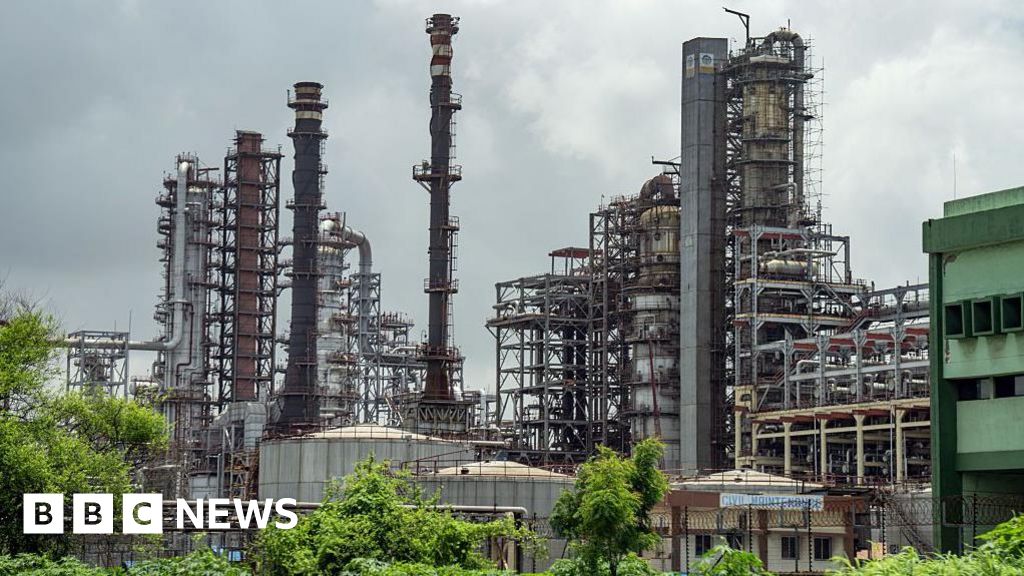Politics
India Prioritizes Best Oil Deals Amid US Tariffs on Russian Imports

India’s commitment to securing the best oil prices remains steadfast, as emphasized by its ambassador to Russia, Vinay Kumar. He stated that the country will continue to purchase oil based on market conditions to protect the interests of its population of approximately 1.4 billion. This declaration comes in the wake of Donald Trump implementing significant tariffs, including a 25% penalty on imports of Russian oil and weaponry, which are set to take effect shortly.
The geopolitical landscape surrounding energy imports has become increasingly complex. JD Vance, the US Vice-President, disclosed that these tariffs are part of a strategy to apply “aggressive economic leverage” on Russia, aiming to halt its ongoing military actions in Ukraine. Since the outbreak of the war, India’s imports of Russian crude oil have surged, accounting for 35-40% of its total oil imports in 2024, a significant rise from just 3% in 2021. The United States has accused India of indirectly funding the conflict in Ukraine through these purchases, a claim that New Delhi has firmly rejected.
In an interview with Russia’s TASS news agency, Kumar reiterated India’s focus on energy security, asserting that trade decisions will prioritize market factors. He characterized Trump’s impending secondary tariffs as “unfair, unreasonable and unjustified.” This sentiment was echoed by India’s Foreign Minister S. Jaishankar, who defended India’s stance on Russian oil imports, questioning the United States’ motives. On Saturday, Jaishankar remarked, “It’s funny to have people who work for a pro-business American administration accusing other people of doing business.” He highlighted that the US has not imposed similar tariffs on China, the largest importer of Russian oil, or the European Union, which continues substantial trade with Russia.
India’s diplomatic position remains nuanced. While it maintains friendly relations with Ukraine, it also regards Russia as a key ally. New Delhi has consistently advocated for a “peaceful resolution through dialogue and diplomacy” in the ongoing conflict, refraining from publicly condemning Russia despite pressure from Western nations. In a notable diplomatic gesture, Prime Minister Narendra Modi visited Ukraine in 2024, expressing India’s willingness to contribute to peace efforts.
In further developments, the Ukrainian ambassador to India, Oleksandr Polishchuk, indicated that President Volodymyr Zelensky may visit India soon, with specific dates yet to be confirmed. Meanwhile, Russian President Vladimir Putin is also expected to visit India later this year, underscoring the importance of India in the geopolitical landscape.
As discussions surrounding energy security and international relations continue, Vance expressed confidence in Trump’s efforts to resolve the situation in Ukraine. He stated, “He (Trump) tried to make it clear that Russia can be re-invited into the world economy if they stop the killing. But they are going to continue to be isolated if they don’t stop the killing.”
In summary, India’s approach to energy procurement illustrates a balancing act between securing essential resources and navigating complex international relations, particularly with the United States. The unfolding situation will likely influence the dynamics of India’s trade relationships in the coming months.
-

 World4 months ago
World4 months agoSBI Announces QIP Floor Price at ₹811.05 Per Share
-

 Lifestyle4 months ago
Lifestyle4 months agoCept Unveils ₹3.1 Crore Urban Mobility Plan for Sustainable Growth
-

 Science3 months ago
Science3 months agoNew Blood Group Discovered in South Indian Woman at Rotary Centre
-

 World4 months ago
World4 months agoTorrential Rains Cause Flash Flooding in New York and New Jersey
-

 Sports3 months ago
Sports3 months agoBroad Advocates for Bowling Change Ahead of Final Test Against India
-

 Top Stories4 months ago
Top Stories4 months agoKonkani Cultural Organisation to Host Pearl Jubilee in Abu Dhabi
-

 Science4 months ago
Science4 months agoNothing Headphone 1 Review: A Bold Contender in Audio Design
-

 Top Stories4 months ago
Top Stories4 months agoAir India Crash Investigation Highlights Boeing Fuel Switch Concerns
-

 Sports3 months ago
Sports3 months agoCristian Totti Retires at 19: Pressure of Fame Takes Toll
-

 Business4 months ago
Business4 months agoIndian Stock Market Rebounds: Sensex and Nifty Rise After Four-Day Decline
-

 Politics4 months ago
Politics4 months agoAbandoned Doberman Finds New Home After Journey to Prague
-

 Top Stories4 months ago
Top Stories4 months agoPatna Bank Manager Abhishek Varun Found Dead in Well









